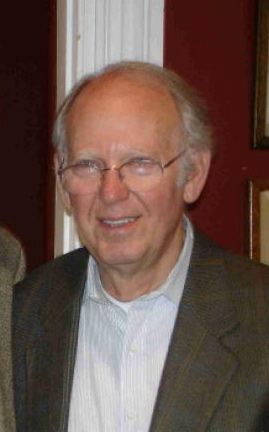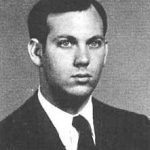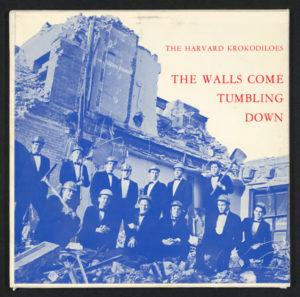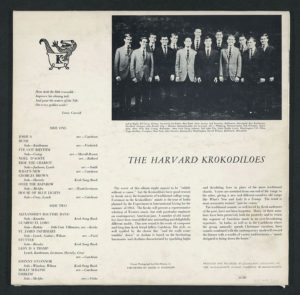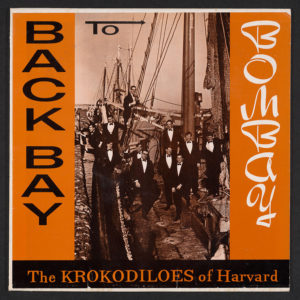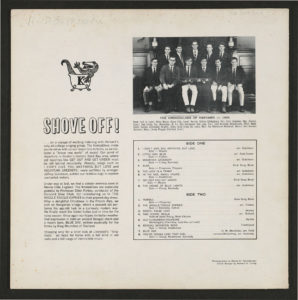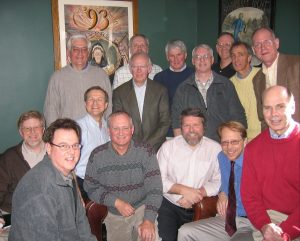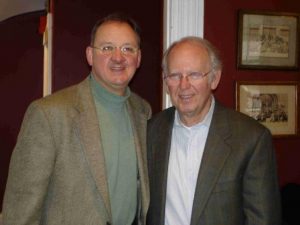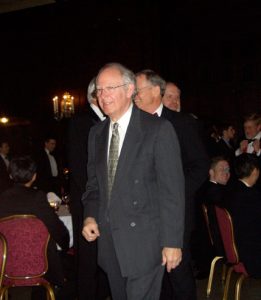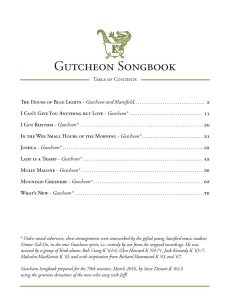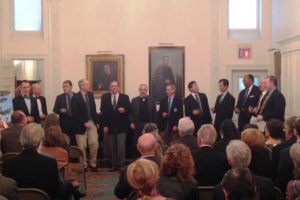For the 1966 album, Back Bay to Bombay, Jeff arranged three more songs – I Can’t Give You Anything but Love, Mountain Greenery, and In the Wee Small Hours.
For a typical arranging session, Jeff would ride his motorcycle over from MIT, come in the back door of the Hasty Pudding auditorium, set his motorcycle helmet on the piano, and start teaching the latest arrangement. Nothing was written down. In each session, he would teach about eight bars of music, note by note, part by part, until we had it. In the next session, he would add another section of music, sometimes revising the earlier parts, and so on until the song was complete. We never knew what was coming next and it was fascinating to watch Jeff’s creativity in action.
Jeff ’s arrangements took the Kroks to a completely new level of sound that typically combined a percussive bass line (“B-doom, doom, doom…”) with lush five and six part harmonies that challenged our harmonic skills and vocal ranges. These inventive musical numbers also contained wonderful parody and humor that delighted us and our audiences. We Kroks of the ‘60’s will always be grateful to Jeff for the one thing that made us stand out from other vocal groups, The Gutcheon Sound!”
In 2002, during the build-up to the 60th and the initial digitizing phase of the Krok Archives, Jeff wrote:
“To the Kroks I worked with, thanks for the opportunity to keep creating in that cherished medium. Your continuous enthusiasm and work ethic made it fun for me. And, you were the best singers of all that I ever worked with.
The story of how we teamed up is by now apocryphal, so let me set the archives straight. In my first year at MIT design school I lived in a 5th floor garret on Beacon St. in Back Bay. I was having a tough time adapting to MIT, a cold place after a warm fuzzy experience at Amherst. I had only a guitar, which I couldn’t really play, no friends and I was in deep distress.
Then, one chilly night outside my window, I heard the unmistakable sounds of a triple quartet and my little heart leapt. The Kroks were serenading the girls at Leslie (I think), across the street and down the block from my place. I jumped into my coat, hoping to catch them before they departed. Luckily, they sang a few more songs, after which I identified myself. Some of the Kroks vaguely remembered me because the Zumbyes, a fairly progressive group for those days, often made a yearly appearance at a concert in Sanders Theater. The true wonder is that, when I offered my services on that cold and dark street, they connected with it right away, so we were off and running. They could have asked themselves “who is this nut?” and politely said “no, thanks.”
Now, I would never have had the audacity to introduce myself under ordinary circumstances, but there was something just right about the way it all fell together, and we went from there to do some work that certainly ranked with anything I had ever produced, thanks in no small way to the Kroks’ musical talent and their willingness to try new ideas. Although I had a wonderful stretch with my own group before coming to Cambridge, my association with the Kroks was truly memorable. And I still have, somewhere, the sterling commemorative bowl they gave me at a special dinner for three years of meritorious service.
A side benefit from our working arrangement, (beside dinner!) was that it brought me into the Harvard Square area. Soon I hooked up with the folk music crowd that was holding forth at the Club 47, and that set of associations produced a good part of what has since been my musical “career.” You can find out more about that at www.thecoolgroove.com, where I’m sure you’ll be pleased to see the Kroks referenced in my biography/discography.
Also, even though I am not a Harvard alum, I would be proud to be a Krok Alum, in case that is possible.”
Jeff has always been thought of as a special kind of Krok and was given a ceremonial silver bowl back in the 1960s to commemorate his importance to the group. The group reconnected with Jeff in 2002 and invited him to the 60th Anniversary of the Kroks in 2006. At that time, he was officially inducted as an Honorary Krok by the Kroks of 1964.
Peter Mansfield, the most prolific and influential of all Krok arrangers, had the following to say about Jeff and his arrangements:
“Jeff was a genius in the purest sense. I now realize that when I began my Krok experience, my sense and great admiration of the Krok style was cast in the sound of Jeff’s brilliant arrangements. He had an unusually sophisticated sense of harmonic color and language, and an innate awareness of vocal rhythm that was way ahead of his time. And all of this imparted in a aural, not written, process! Amazing, and such a rich and important legacy.”
He was in very good health at the time of the 60th Anniversary and attended all the events that weekend, including the banquet at the Harvard Club of Boston.
Shortly before Jeff’s death, and with financial support from alumni from the 1960’s, Steve Dostart, archivist, enlisted the help of two professional transcribers (Herb Goodrich and Omree Gal-oz) and a panel of alums lead by Malcolm MacKenzie (and including Jack Kennedy, Bob Croog, Glen Howard and Peter Mansfield) to transcribe Jeff’s works for the Kroks. This was not a simple task given the complexities of his harmonies and his penchant for crossing parts. Omree’s work in sorting out the parts was at a Jeff Gutcheon level of genius.
Jeff passed in 2013 and a group of alumni assembled to sing some of Jeff’s arrangements at his Memorial Service using the written versions to “freshen their memories”. Per Malcolm MacKenzie, “Peter Lerangis’ musicality, enthusiasm, and beneficent spirit were indispensable at the memorial, as in so much else.”
In the build up to the 70th Anniversary, the transcriptions of his complete works for the Kroks were brought together into the Gutcheon Song Book and sent out to ALL Kroks in honor of Jeff’s contributions to our brotherhood.
Obituaries:
Amherst Magazine
Jeff Gutcheon was the first to arrive at 414 Morrow, the narrow room we shared freshman year. He had unpacked. I recall a couple of handsome tweed jackets, an array of repp ties, and his collection of LPs, from Rimsky-Korsakov to Thelonious Monk. These artifacts resonate in memory, evoking the young guy I came to know, already somehow more sophisticated than the world he wanted to enter. All his life Jeff had an uneasy relationship with privilege, and it gave energy and edge to his art.
Jeff had almost an embarrassment of talents -–for math and science and for design–in addition to his musical gifts. He had begun studying classical piano at age 7, and as a teenager took up jazz. He left a lasting mark on Amherst music with his innovative arrangements for the Zumbyes. After graduation, he earned a degree in architecture from MIT. He never formally practiced in that profession, though he designed and built two beautiful houses in coastal Maine, and a recording studio in New York. Music was his abiding interest and the true heart of a career that also involved various business ventures.
He recorded with such figures as Willie Nelson, Gladys Knight, Steve Goodman, Ringo Starr, Great Speckled Bird and Geoff and Maria Muldaur.
He was known as one of the great stride pianists of his generation, and he arranged much of the music for the original version of “Ain’t Misbehavin’,” the hit Broadway show. He was still recording, with the Texas band Lost Country, when ill health overtook him.
In 1982 he endowed The Jeffrey D. Gutcheon 1962 Music Fund in support of student musicians.
His two marriages ended in divorce. With his first wife, the novelist Beth Gutcheon, he had a son, David. David was his devoted companion and caregiver during his last difficult years. Jeff died of the degenerative disease Lewy body dementia, on June 23, 2013, in Brooklyn.
—-DICK TODD ’62 –
The New York Times, June 30, 2013
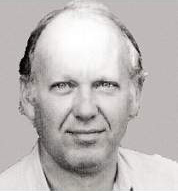 GUTCHEON–Jeffrey. Composer, arranger, songwriter, author, designer and architect, died in New York on June 23d, 2013 following a long struggle with Lewy body dementia. Born in New York City in 1941, Jeffrey was Phi Beta Kappa at Amherst College, then earned a B. Arch from MIT. He played piano and organ in many styles (rock, country, gospel), and performed and recorded with, among others, Gladys Knight, Willie Nelson, Steve Goodman, Ringo Starr, Great Speckled Bird, and Geoff and Maria Muldaur. The album he released with his band Hungry Chuck (Bearsville records, 1972) has achieved cult status, the subject of numerous bootlegs and re-issues. He designed recording studios, most notably the Hit Factory on 48th St. He was one of the great stride piano players of his generation, and the original musical director of Ain’t Misbehavin’ the first hit non-book musical, which won the Tony award for Best Musical 1978. A polymath, he was also a force in the American art quilt movement, and authored or co-authored several iconic books on the subject. Jeffrey designed and distributed innovative fabric patterns for two decades through his company, Gutcheon Patchworks, and taught quilting and fabric arts to fans around the world. He served as president of the board of the Haystack Mountain School of Crafts in Deer Isle, Maine and is a member of the Quilters’ Hall of Fame. He recorded four albums with the Texas band Lost Country before declining health forced his retirement. He is survived by his son David Gutcheon, his sister Peppi Graves, Ed Graves and his niece Lucy Graves, and is mourned by extended family and friends from the many worlds in which he lived his life. A memorial will be held in New York in the fall, and donations may be made in his honor to The Jeffrey D. Gutcheon 1962 Music Fund by contacting the Amherst College Development Office.
GUTCHEON–Jeffrey. Composer, arranger, songwriter, author, designer and architect, died in New York on June 23d, 2013 following a long struggle with Lewy body dementia. Born in New York City in 1941, Jeffrey was Phi Beta Kappa at Amherst College, then earned a B. Arch from MIT. He played piano and organ in many styles (rock, country, gospel), and performed and recorded with, among others, Gladys Knight, Willie Nelson, Steve Goodman, Ringo Starr, Great Speckled Bird, and Geoff and Maria Muldaur. The album he released with his band Hungry Chuck (Bearsville records, 1972) has achieved cult status, the subject of numerous bootlegs and re-issues. He designed recording studios, most notably the Hit Factory on 48th St. He was one of the great stride piano players of his generation, and the original musical director of Ain’t Misbehavin’ the first hit non-book musical, which won the Tony award for Best Musical 1978. A polymath, he was also a force in the American art quilt movement, and authored or co-authored several iconic books on the subject. Jeffrey designed and distributed innovative fabric patterns for two decades through his company, Gutcheon Patchworks, and taught quilting and fabric arts to fans around the world. He served as president of the board of the Haystack Mountain School of Crafts in Deer Isle, Maine and is a member of the Quilters’ Hall of Fame. He recorded four albums with the Texas band Lost Country before declining health forced his retirement. He is survived by his son David Gutcheon, his sister Peppi Graves, Ed Graves and his niece Lucy Graves, and is mourned by extended family and friends from the many worlds in which he lived his life. A memorial will be held in New York in the fall, and donations may be made in his honor to The Jeffrey D. Gutcheon 1962 Music Fund by contacting the Amherst College Development Office.
The Cool Groove
(Jeff’s website)
JEFF GUTCHEON was born January 3, 1941 in New York City. At age 12 he fired his classical piano teacher of five years, after his friend Arthur Elgort sold him a Fats Waller record and a Boogie Woogie sampler for $2.00. He spent his high school years learning these styles and immersed in New York’s rich musical culture which then included the doo-wop rock of Frankie Lymon, the be-bop of Thelonius Monk and Horace Silver, traditional folk music and Broadway Musicals like West Side Story.
Gutcheon first became interested in performing when he heard the Amherst College Zumbyes, a jazz-oriented triple-quartet sing at a freshman meeting. Excited by the possibilities of jazz singing, he later joined the group as arranger and then leader. At the same time, growing interest in folk music was represented on the Amherst campus by Jim Rooney and Bill Keith. By his senior year, Jeff’s eclectic approach to contemporary music was firmly established or maybe inescapable. That spring the Count Basie band played at the prom and campus parties featured Chuck Berry at one fraternity, while Taj Mahal and the Electras, a local group from Springfield, Massachusetts, played at another.
Entering architecture grad school at MIT in the fall of 1962, Jeff continued developing his vocal arranging style with the Harvard Krokodiloes, but was increasingly drawn to the creative folk music scene that was happening around the Club 47 in Harvard square. Playing a few old time piano blues numbers at a hootenanny there one night in August 1963 served as an introduction to the local guitar pickers. Soon he befriended Geoff and Maria Muldaur who were playing with the Jim Kweskin Jug Band and Mitch Greenhill, songwriting guitarist with whom he formed a duet loosely patterned after the Leroy Carr-Scrapper Blackwell style. Jeff and Mitch performed at the Newport Folk Festival in the summer of 1966, and Jeff’s appearance on Mitch’s Prestige album in 1965 marked his entry into the recording field, both as piano player and ad hoc vocal arranger
Meanwhile, in the MIT design studios, a 24-hour-a-day stream of pop music on the AM radio heralded the English rock and the American R&B explosion and Gutcheon began to write songs and piano compositions. Besides playing local gigs with Mitch, Jeff formed a skiffle trio called Spike’s Group, with guitarist Dave Barry and bassist Spike Holden. Dave’s friend Jon Child helped record the group at performances while Jon applied his recording know-how to the pop tunes Jeff was writing. The results were exciting and good enough to convince them it was worth a shot at the pop music scene. Picking up drummer Eric Valdina and lead vocalist Jeff Jordan from the Harvard rock group The Forerunners, and adding lead guitarist R.O. Curtis, Thundrgrin was formed with Jon playing bass.
When school commitments were completed in 1967, the band moved to New York City in search of a recording career loosely based on Gutcheon’s songwriting and arranging, with a melodic sound. The group’s first single on Epic records was not successful. Jeff Jordan left the group and was replaced as lead singer by Robert Patterson. This new configuration had a harder edge and attracted the interest of Jeffrey and Chandler, Jimi Hendrix’ management team who took on the group renamed as Jessie’s First Carnival. The “Carnival” began work on an album and played at The Café Wha?, a Greenwich Village club. Other groups playing there at the time included Bo Grumpus with bass player Jim Colegrove and Kangaroo, with drummer N.D. Smart. Gutcheon, Colegrove and Smart formed an affinity for one another’s musical styles and resolved to seek opportunities to play together. Thus, a lasting friendship and the nucleus of Hungry Chuck was born. The first such opportunity occurred in 1969 when Barbara Keith, lead singer/songwriter of Kangaroo, was signed to make a solo album by Verve records. Jim, Jeff, and N.D. formed the rhythm section for the album, including R.O. Curtis as guitarist.
During 1968-9, the Kweskin Jug Band disbanded, as Geoff and Maria Muldaur began a recording career together with their own unique blues-country-R&B style. In a tryout relationship with R&B producer Jerry Ragovoy they recorded one of Gutcheon’s songs, All Bowed Down, which was eventually released on a Warner/ Reprise sampler album. Although Geoff and Maria did not hit it off with Jerry Ragovoy, Gutcheon became an apprentice at Ragovoy’s Hit Factory studio, and was engaged to design his new Hit Factories on 48th street, both of which became popular recording venues for artists such as B.B. King, Bonnie Raitt and John Lennon
As part of his apprenticeship, Jeff joined the Hit Factory scene, and was present at several notable sessions, including the first James Gang record and John Sebastian’s first solo album. One night between takes, Sebastian heard Gutcheon playing piano in the studio and mentioned it favorably to David Bromberg who then asked Jeff to become part of a small ensemble he was putting together for an Elektra record with Paul Siebel. Siebel’s record, now considered legendary, was released in 1969 and Jeff joined Bromberg and Gary White playing behind Siebel, opening two concerts for The Band.
Gutcheon’s, Colegrove’s and Smart’s various band ventures were not progressing. Those groups eventually disbanded, while gigs as sidemen became more lucrative and attractive. Jim and N.D. moved to Woodstock. N.D. had become the drummer for Ian and Sylvia’s Great Speckled Bird and Jim then joined that group. When Ian and Sylvia got an opportunity make a weekly network TV show in Toronto, Jim and N.D. pulled Jeff into the studio band which then, along with guitarist David Wilcox and pedal steel/dobro player Ben Keith, taped more than 60 TV shows between 1970 and 1972 and contributed to the formation of country-rock in the early ’70s, both in Canada and the U.S.
At the same time, guitarist Amos Garrett left Ian and Sylvia’s band to play with a new group being formed in Woodstock by Geoff and Maria Muldaur. Amos became next-door neighbors with Jim and N.D., giving them an opportunity to continue the musical relationship formed in the Great Speckled Bird. During the three week lapses between TV sessions in Toronto, Jeff continued writing songs, playing local gigs in New York and designing/building recording studios. When Art Polhemus a producer/engineer who worked occasionally for Jerry Ragovoy, decided to build his own studio, he made an arrangement with Gutcheon to provide the design and supervise the construction in return for sufficient recording time to make and album demo. These sessions, which Jim, N.D., Amos and Jeff rehearsed in Woodstock, were the first recordings at Polhemus’ Coordinated Sound Studio, and sold Hungry Chuck as a music concept to Albert Grossman’s Bearsville label. The album was completed in Woodstock with the addition of Ben Keith and cornetist Peter Ecklund, featuring seven of Jeff’s songs and outstanding instrumental work from the entire ensemble, with a little help from Garth Hudson, Geoff Muldaur and Paul Butterfield. The Hungry Chuck album, originally released in 1972 as Bearsville BR2071, has been released in Japan by Warner/Pioneer (1977), CBS/SONY (1983), Pony Canyon (1995) and twice in a UK/Europe pirated version.
During the ’70-’76 period, Gutcheon continued to develop musical affiliations in New York, playing with guitarist Steve Burgh, bassist Hugh McDonald, and drummer Steve Mosley on albums by David Bromberg, Steve Goodman, Willie Nelson, and Gladys Knight. In 1973-4 he also played with Maria Muldaur’s traveling band when her first album became popular and appeared on one track of her second album, Waitress in a Donut Shop.
From 1976-8 Jeff recorded with a number of Philo artists, including Lou London, Jay Ungar/Lyn Hardy, Doris Abrams and Rosalie Sorrels. He also wrote and recorded theme and incidental music for The Learning Path, a PBS series about the Menominee Indians of Wisconsin produced by Joel Friedman.
In the fall of 1978, Gutcheon was approached by Richard Maltby to join a team creating a cabaret evening of Fats Waller’s music to be presented at the Manhattan Theatre Club in early 1979, with a cast that included Nell Carter, Irene Cara, Ken Page, and Andre de Shields. That revue, extremely successful, was quickly sold to Broadway producers as Ain’t Misbehavin’, although encumbered by several lawsuits concerning payment and credit, among them actions initiated by Gutcheon and by members of the cast. As a result, Gutcheon established himself as one of the show’s authors, and in a landmark decision, paved the way for arrangers to become royalty participants in shows based on previously existing music.
The years 1978-9 also saw the publication by Music Sales Corporation of Jeff’s piano instruction books Improvising Rock Piano and Teach Yourself Rock Piano, both of which are still in circulation.
During the 1980s Gutcheon’s musical involvements took a hiatus as he pursued other career interests in design and textile design, while further developing his piano playing. New work was finished on tracks with the members of Hungry Chuck in 1999. Recordings by a new group that includes Jeff, Jim Colegrove, Fort Worth steel guitarist David McMillan and vocalist Susan Colegrove were completed in 2000. The group is called Lost Country®. Lost Country® – Broken People was released on Cool GrooveTM CD101, April 2001. Their second CD, Down On The Borderline, was released in June 2002. During that summer Jeff moved to Fort Worth, Texas. The group’s third CD, Turn Your Radio Around, was issued in November 2003. Their fourth CD, Long Gone Thrill, was released November 2005. The last record Jeff did with the group is titled Scattered and was released in July 2007.
Jeff retired from public performing in September, 2007 due to health reasons. In April, 2008 he returned to New York. Jeffrey passed away on June 23, 2013. We will miss a dear friend.


